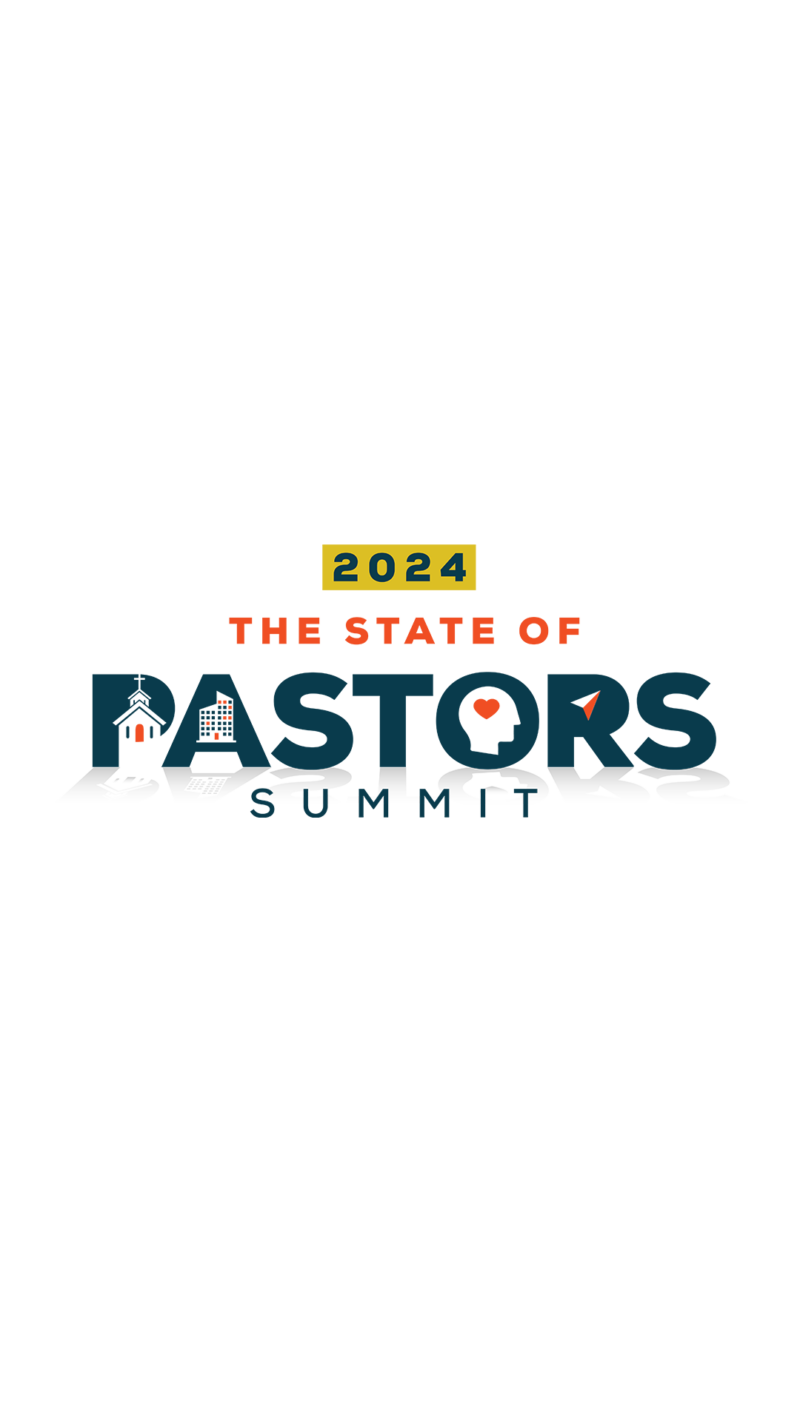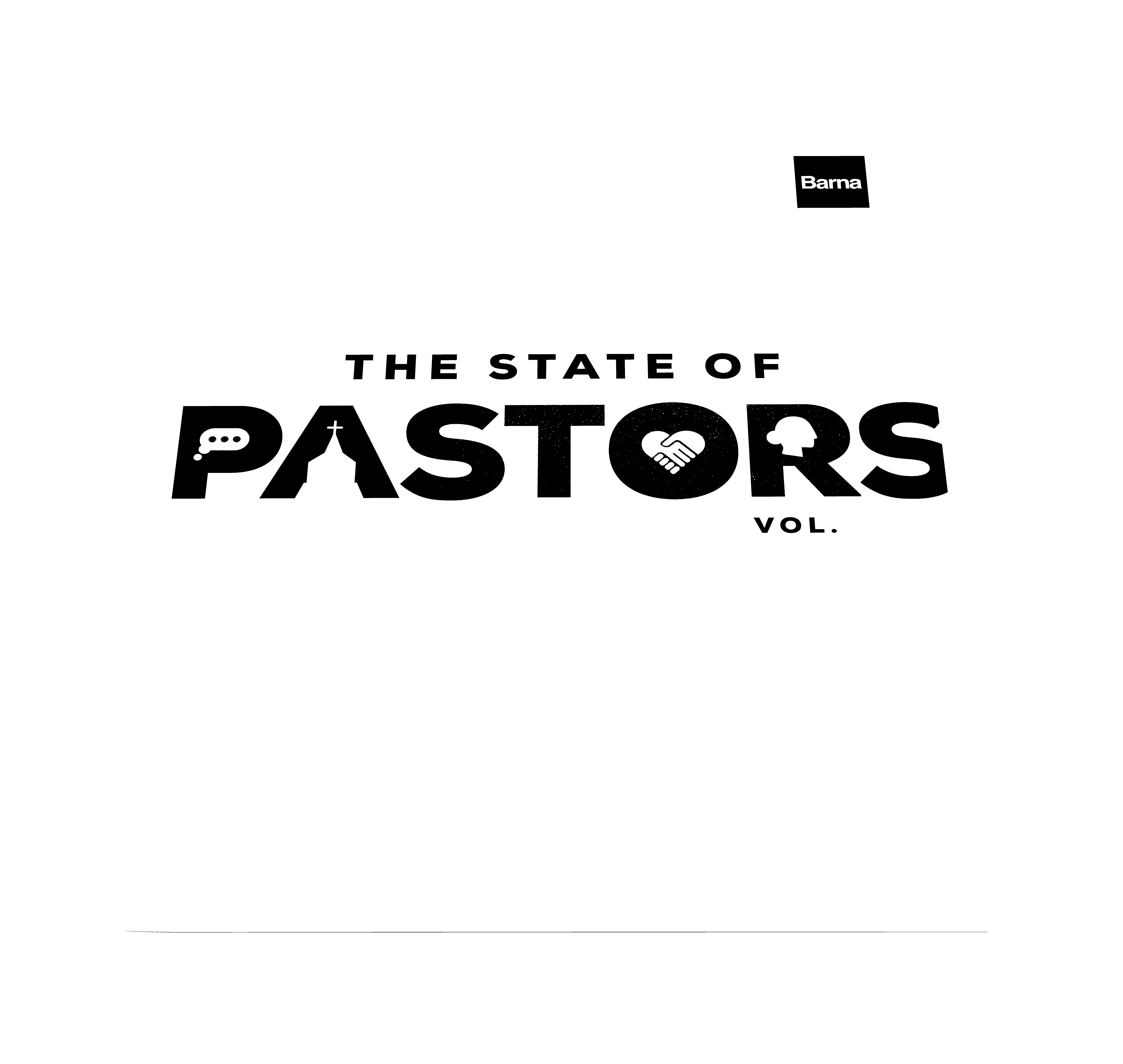If you listen to the stump speeches of any presidential candidate, it’s unlikely you’ll come away with a clear picture of what Americans desire for their nation. One candidate claims America is on the right path and needs to stay the course while the other claims the country is in free-fall and needs a major policy overhaul. So which of those visions squares with what the people seem to want? A new study from Barna reveals most American registered voters are displeased with the status quo.
Your Leadership Toolkit
Strengthen your message, train your team and grow your church with cultural insights and practical resources, all in one place.
Consistent Responses
How was that displeasure revealed? For starters, 72 percent of registered voters indicate they believe the United States is headed in the wrong direction. This sentiment is fairly pervasive—with the exception of liberals. When it comes to political ideology, nine out of ten conservatives (87%), and seven out of ten moderates (69%) agree America is headed in the wrong direction. However, less than half of all liberals (45%) agree with the rest—the majority of which believe the nation is actually headed in the right direction (55%). Among religious segments, more than nine out of ten evangelicals (93%) and four out of five non-evangelical born again Christians (80%) say we’re headed in the wrong direction. Solid majorities of the other three major faith constituencies concur: notional Christians (72%), adults aligned with a non-Christian faith (59%), and skeptics (63%). Church attendance does not seem to affect this point-of-view: seven out of ten churched and unchurched adults gave the same answer.
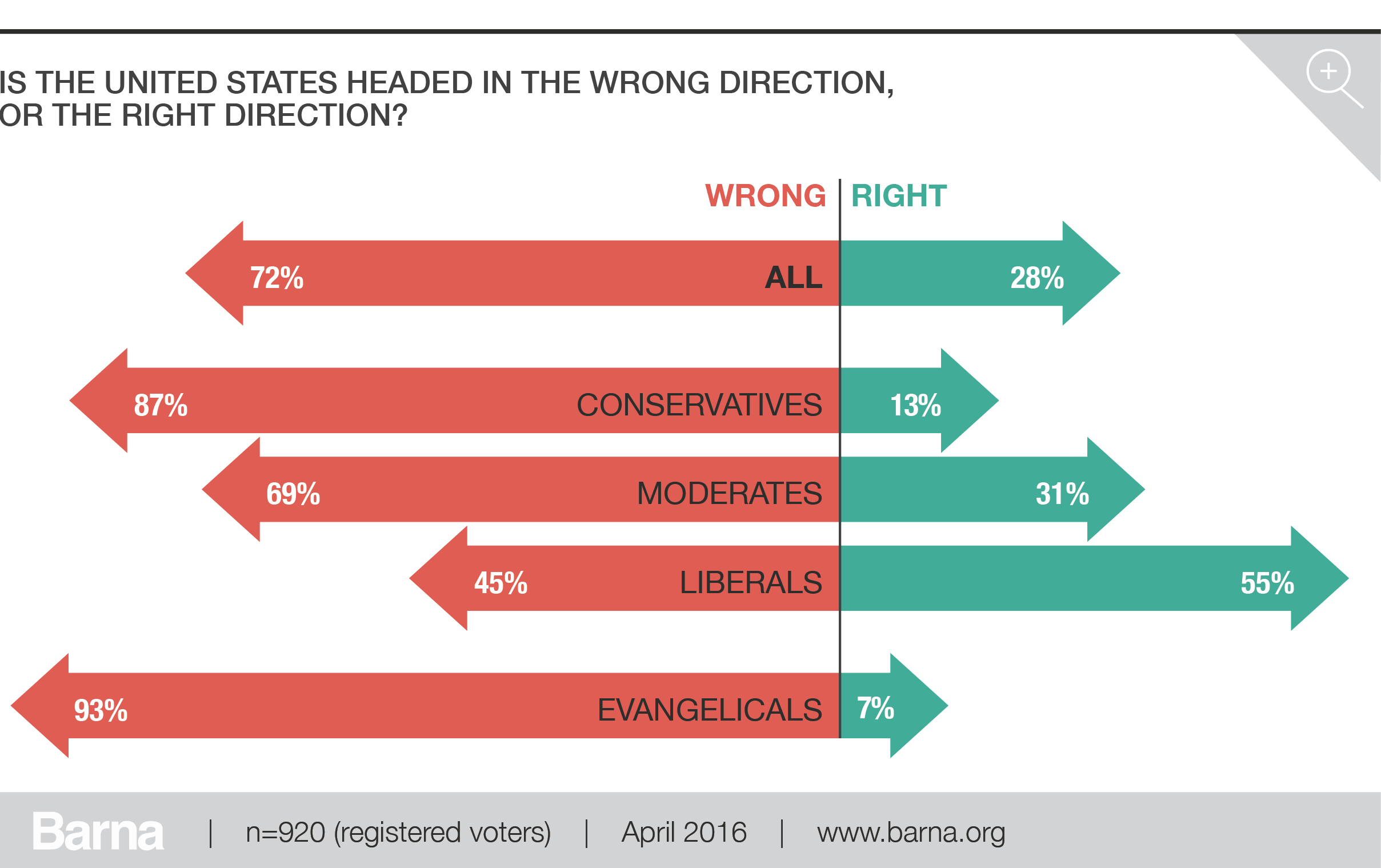
The sense that we have gotten off-track is reinforced by the evidence that less than three out of ten U.S. voters (28%) believe they are well-served by the federal government. In fact, a minority of every subgroup of the voting public studied felt the federal government is serving them well. The segment that was most likely to feel positive about the government’s efforts was individuals who intend to vote for Hillary Clinton: 46 percent of them feel well-served. In contrast, notably smaller proportions of all three of the primary ideological niches—liberals (36%), moderates (30%), and conservatives (18%)—felt well-served. Among the faith segments, evangelicals were only half as likely as the rest of the population to feel well-served (14%). Twenty-seven percent of those who are non-evangelical born again Christians or notional Christians feel well-served, which was slightly lower than the one-third of the voters associated with a non-Christian faith or who have no religious faith.
There appears to be a deep well of negative emotion across the nation. For instance, a large majority of voters (82%) admit to being “frustrated” with the federal government. That emotional unrest spans all segments of the population. It largely transcends ideology, characterizing the views of 87 percent of conservatives, 82 percent of moderates, and even three-quarters of liberals (74%). Frustration is common across all of the five faith niches, ranging from a high of 87 percent among evangelicals to a low of 76 percent among voters aligned with a non-Christian faith.
Perhaps the most notable outgrowth of these perceptions and emotions is that a majority of voters (56%) describe themselves as feeling “angry” towards the federal government. This anger is widespread, ranging from 63 percent among evangelicals and 61 percent among skeptics to 57 percent among notionals, 50 percent among non-evangelical born again Christians, and 43 percent of the people aligned with other faiths.
Unlikeable Candidates
There is another dimension to the clear frustration of voters: the historic low levels of favorability accorded to the two major-party candidates. While favorability ratings do not directly correspond to people’s likelihood of voting for a person, the overwhelmingly negative impressions held of both major candidates reflects Americans’ disenchantment with its most visible public leaders—especially since these were the two individuals who received the most votes for their party nomination from a field of more than 20 prominent politicians and are being assessed as our primary future leader.
Hillary Clinton received favorable ratings from just 38% of the registered voters and unfavorable ratings from 60%. Donald Trump fared even worse: just 29% were favorable toward him and 69% unfavorable. Those are not the kind of ratings that suggest a voting public that foresees strong, positive leadership coming soon to the White House.
The five faith segments had distinct views about the candidates – and those views were consistently negative. Overall, 31% of evangelicals had a favorable disposition toward Trump while just 17% had a similar perception of Clinton. Non-evangelical born again adults had very similar views on both candidates: 31% were favorable toward Trump and 34% toward Clinton. Notional Christians also held similar impressions of the two competitors (38% favorable toward the Democrat, 34% toward the Republican). Adults associated with a non-Christian faith were much more positive toward Clinton (43%) than Trump (20%). Skeptics gave similar marks to both candidates, though they were the lowest ratings awarded by any of the five faith segments.
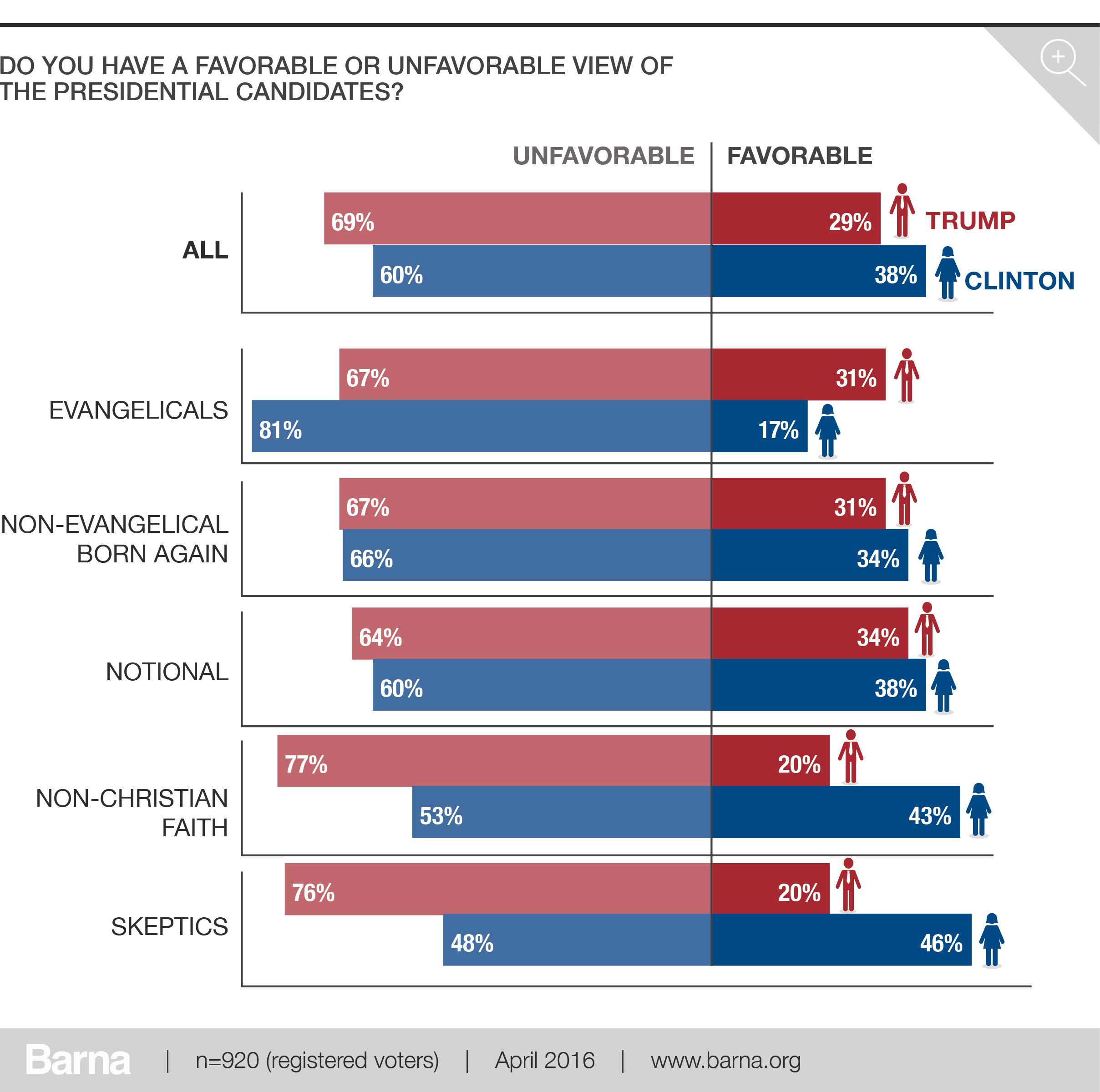
Then Which Direction?
When people are pushed to describe how they want the nation to change, the conversation gets more uncomfortable.
Do Americans want more government or less government at the federal level? While voters lean toward less government, there is no clear mandate to move in that direction. A plurality of voters (45%) stated they would prefer a federal government that is “less active and far-reaching than we currently have.” About one-third of the voters (34%) opted for keeping things the way they are now. The remaining one-fifth (21%) wanted the federal government to become “more active and far-reaching than we currently have.”
Not surprisingly, seven out of ten conservatives (70%) vied for a smaller, less active government. Unexpectedly, a plurality of moderates (44%) joined in that chorus. It’s just as surprising that liberals were divided equally between sticking with the government we have today (40%) and expanding to a more active and far-reaching form (39%).
Examining the faith segments, evangelicals were the only niche for which a majority expressed a governance preference: 64 percent desired a less active, less far-reaching federal system. A plurality of non-evangelical born agains (47%), notionals (44%), and skeptics (41%) echoed that perspective. People aligned with non-Christian faiths were the only segment for which a plurality (45%) wanted to stick with what we have now.
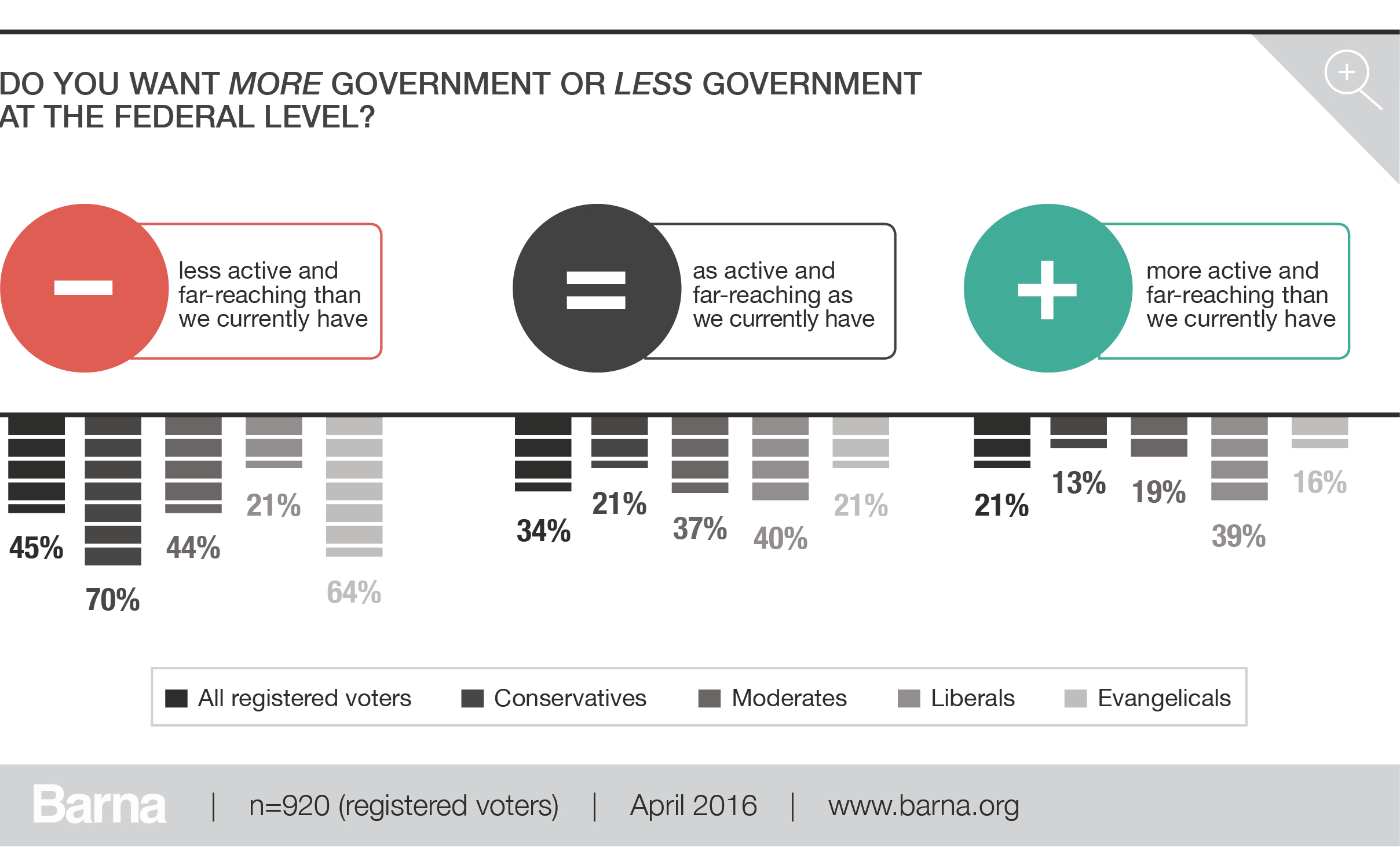
Another change relates to the kind of president people want in 2017: one who has had prior experience in government or one whose experience has been outside of government. Once again, there is no clear-cut sentiment embraced by voters. Equal numbers of people said they would prefer a president with prior government experience (37%) as said it does not matter (38%). The remaining 25 percent prefer a president with no government experience.
Evangelicals were the faith segment most likely to say it does not matter (49%). Non-evangelical born again Christians and skeptics were the faith segments most likely to indicate a preference for someone with government experience (40% each).
Your Leadership Toolkit
Strengthen your message, train your team and grow your church with cultural insights and practical resources, all in one place.
What the Research Means
George Barna, special analyst for the 2016 election polling, compared the current plight of Americans with a person who cannot articulate what they want but claim they will know it when they see it. “Voters are perhaps as upset with themselves as they are with the system and its inhabitants,” he says. “They know something substantial must be done, but either they don’t know what that prescription is or they don’t have the courage to pursue it. The prevailing sentiment is that we are beyond the point of tinkering. Whether people like Donald Trump or not, and whether or not they embrace his proposed solutions, many resonate with the sense that America has lost its mojo. And they realize restoring it at this point will be much harder than simply maintaining it might have been.”
Comment on this research and follow our work:
Twitter: @davidkinnaman | @roxyleestone | @barnagroup
Facebook: Barna Group
About the Research
This research was conducted by the Barna Group using an online survey with a nationally representative sample of adults 18 and older. A total of 920 registered voters participated in the survey, which was conducted from April 7 through April 14, 2016. The estimated maximum sampling error for the aggregate sample is plus or minus 3.3 percentage points at the 95-percent confidence level. The sampling error estimate is higher for subgroups within the total sample.
The study divided respondents into five unique faith segments based on their religious beliefs.
Evangelicals met nine specific theological criteria. They said they have made “a personal commitment to Jesus Christ that is still important in their life today,” that their faith is very important in their life today; believe that when they die they will go to Heaven because they have confessed their sins and accepted Jesus Christ as their Savior; strongly believe they have a personal responsibility to share their religious beliefs about Christ with non-Christians; firmly believe that Satan exists; strongly believe that eternal salvation is possible only through grace, not works; strong agree that Jesus Christ lived a sinless life on earth; strong assert that the Bible is accurate in all the principles it teaches; and describe God as the all-knowing, all-powerful, perfect deity who created the universe and still rules it today. Being classified as an evangelical is not dependent on self-identification, church attendance, or the denominational affiliation of the church attended. Respondents were not asked to describe themselves as “evangelical.”
Non-evangelical born again Christians say they have made “a personal commitment to Jesus Christ that is still important in their life today” and believe that when they die they will go to Heaven because they have confessed their sins and accepted Jesus Christ as their Savior. However, they do not accept all of the other seven theological beliefs that categorize someone as an evangelical.
Notional Christians are people who consider themselves to be Christian but they have not made “a personal commitment to Jesus Christ that is still important in their life today” or believe that when they die they will go to Heaven because they have confessed their sins and accepted Jesus Christ as their Savior.
People aligned with non-Christian faith groups included anyone associated with a religious community or perspective besides Christianity, such as Judaism, Islam, Buddhism and Hinduism.
Skeptics are individuals who describe themselves as atheist or agnostic, indicate that they do not believe in the existence of God, or have no faith-related ties or interests.
Your Leadership Toolkit
Strengthen your message, train your team and grow your church with cultural insights and practical resources, all in one place.
About Barna
Since 1984, Barna Group has conducted more than two million interviews over the course of thousands of studies and has become a go-to source for insights about faith, culture, leadership, vocation and generations. Barna is a private, non-partisan, for-profit organization.
Get Barna in Your Inbox
Subscribe to Barna’s free newsletters for the latest data and insights to navigate today’s most complex issues.
